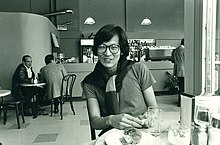Wayne Wang
Wayne Wang ( Chinese 王穎 / 王颖 , Pinyin Wáng Yǐng , Jyutping Wong 4 Wing 6 ; born January 12, 1949 in Hong Kong ) is an American director of Chinese origin.
Life
Wang's family originally came from mainland China and fled to Hong Kong in 1947, where Wayne Wang was born in 1949. Wayne Wang got his first name because of his father's admiration for John Wayne . After graduating from Wah Yan High School in Hong Kong, he emigrated to the United States at the age of 18.
He studied film studies at the California College of the Arts and Crafts in Oakland. His graduation film A Man, a Woman, and a Killer was released in 1975 in the US. He then returned to Hong Kong and worked for RTHK (Radio Television Hong Kong), where he directed several episodes of the popular TV series Below the Lion Rock ( 獅子山 下 / 狮子山 下 ), which focused on social life and views of the at that time mostly simple Hong Kong population in Kowloon and the situation of new immigrants from mainland China in Hong Kong. However, with his novel, unusually adventurous manner, he made himself unpopular with the audience and the television station. His recordings with the handheld camera did not correspond at all to the viewing habits of the audience. The ratings fell and Wang was fired. In the following years he moved to San Francisco and looked after Asian immigrants.
In 1982 he made the movie Chan Has Disappeared for $ 27,000 . The 16 mm film, shot in black and white , became a cult film at many festivals. It won the Independent / Experimental Film and Video Award at the Los Angeles Film Critics Association Awards . In 1984 his highly acclaimed film Dim Sum - Something for the Heart was shown at the Cannes Film Festival and received a nomination for the BAFTA Award for best foreign film.
In 1987 he made his first commercial flick, Blondes Die Formerly, starring Hollywood stars Tom Hulce , Mary Elizabeth Mastrantonio and Virginia Madsen , who was nominated for the Deauville Festival Critics Award. In 1989 the films A Cup of Tea for Love , based on a novel by Luis Chu, and the small independent comedy Life is Cheap hit theaters. Wang shot a cup for love with his wife Cora Miao ( 繆 騫 人 / 缪 骞 人 , Miào Qiānrén , Jyutping Miu 6 Hin 1 jan 4 , former Miss Hong Kong) in the lead role. In 1993 he filmed the bestseller The Joy of Amy Tan . For this, the screenwriting team Amy Tan and Ronald Bass received nominations for the BAFTA and the Writers Guild of America .
In 1994 Wayne Wang shot the film Smoke , based on an original script by the writer Paul Auster , which also became a cult film. Wayne Wang and Harvey Keitel won a Silver Bear as a special jury prize at the Berlinale in 1995 and the film received a nomination at the César Awards in 1996 in the Foreign Film category. The success of the film, which also starred William Hurt and Forest Whitaker , was so great that Wang and Auster in 1995 a sequel entitled Blue in the Face with Jim Jarmusch , Madonna and Michael J. Fox in the cinemas brought.
In the following years, films were made such as Chinese Box (1997) with Gong Li and Jeremy Irons , Everywhere, Just Not Here (1999) with Susan Sarandon and Natalie Portman and Power of Desire (2001) with Peter Sarsgaard and Manhattan Love Story (2002 ) with Jennifer Lopez . In 2006, again Ferien with Queen Latifah came to German cinemas. In 2007 Mr. Shi and the song of the cicadas were awarded the Golden Sea Shell at the Festival Internacional de Cine de Donostia-San Sebastián .
Filmography
Director
- 1975: A Man, a Woman, and a Killer
- 1982: Chan is missing (Chan is Missing)
- 1984: Dim Sum - A Little Bit of Heart
- 1987: Blondes Die Earlier (Slam Dance)
- 1989: Eat a Bowl of Tea
- 1989: Life is Cheap (Life is Cheap… But Toilet Paper is Expensive)
- 1991: Stranger (Strangers)
- 1993: Daughters of Heaven (The Joy Luck Club)
- 1995: Smoke - Smokers among themselves (Smoke)
- 1995: Blue in the Face - Alles Blaue Dunst (Blue in the Face)
- 1997: Chinese Box
- 1999: Anywhere but Here (Anywhere But Here)
- 2001: Power of Desire (The Center of the World)
- 2002: Manhattan Love Story (Maid in Manhattan)
- 2005: Winn-Dixie - My Shaggy Friend (Because of Winn-Dixie)
- 2006: One more vacation (Last Holiday)
- 2007: The Princess of Nebraska
- 2007: Mr. Shi and the Song of the Cicadas (A Thousand Years of Good Prayers)
- 2009: Chinatown Film Project
- 2011: The Silk Fan (Snow Flower and the Secret Fan)
- 2014: Soul of a Banquet (documentary)
- 2016: While the Women Are Sleeping
- 2019: Coming Home Again
Web links
- Wayne Wang in the Internet Movie Database (English)
- Wayne Wang at prisma.de
- Wayne Wang in the nndb (English)
Individual evidence
| personal data | |
|---|---|
| SURNAME | Wang, Wayne |
| BRIEF DESCRIPTION | American director of Chinese origin |
| DATE OF BIRTH | January 12, 1949 |
| PLACE OF BIRTH | Hong Kong |
